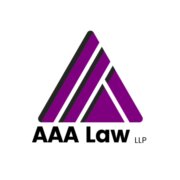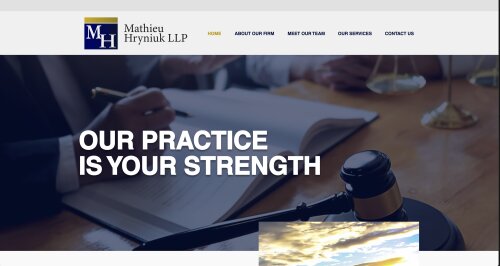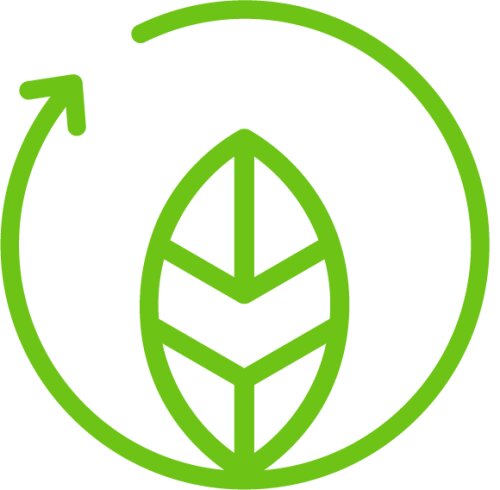Best Business Lawyers in Toronto
Share your needs with us, get contacted by law firms.
Free. Takes 2 min.
List of the best lawyers in Toronto, Canada
Canada Business Legal Articles
Browse our 1 legal article about Business in Canada written by expert lawyers.
- IP Strategy for Canadian Startups: Patent vs. Trade Secret
- Intellectual property (IP) in Canada is governed by a "first-to-file" system, meaning the first person to file a patent application generally has priority over earlier inventors who did not file. Patents offer a 20-year legal monopoly in exchange for public disclosure, while trade secrets provide indefinite protection as long as... Read more →
About Business Law in Toronto, Canada
Business law in Toronto, Canada governs the legal aspects of starting, operating, and closing a business in this city. It covers a wide range of areas including contracts, intellectual property, employment, taxation, and more. Understanding the legal framework is crucial for business owners and entrepreneurs to ensure compliance and protect their interests.
Why You May Need a Lawyer
There are several situations where seeking legal advice from a business lawyer in Toronto is essential:
1. Formation and Structure: When starting a new business, a lawyer can assist in determining the most suitable legal structure, such as a corporation, partnership, or sole proprietorship.
2. Contracts and Agreements: Lawyers help in drafting, reviewing, and negotiating contracts and agreements with clients, suppliers, partners, and employees, ensuring all terms and conditions are favorable and legally binding.
3. Intellectual Property Protection: If your business involves trademarks, copyrights, patents, or trade secrets, a lawyer can help protect your intellectual property rights and enforce them if necessary.
4. Regulatory Compliance: Understanding and adhering to relevant laws, permits, licenses, and regulations is crucial for a business. A lawyer can help navigate and ensure compliance with these legal obligations.
5. Dispute Resolution: In case of any legal dispute, whether it's with an employee, customer, or another business entity, a lawyer can assist in resolving conflicts through negotiation, mediation, or representing you in court if required.
Local Laws Overview
Businesses in Toronto, Canada must comply with federal, provincial, and municipal laws. Some key aspects of local laws relevant to business include:
- Business Registration: Every business operating in Toronto must be registered with the provincial government or appropriate regulatory body depending on the business type.
- Employment Standards: Businesses must comply with employment standards legislation, which includes guidelines for wages, working hours, holidays, and other employment-related matters.
- Consumer Protection: There are laws in place to protect consumers, including regulations governing advertising, product safety, and fair trading practices.
- Taxation: Businesses are subject to various taxes, including corporate income tax, sales tax (GST/HST), payroll taxes, and property taxes.
- Privacy Laws: Businesses must adhere to privacy laws regarding the collection, use, and storage of personal information of employees and customers.
Frequently Asked Questions
Q: How do I register my business in Toronto?
A: To register your business, you need to visit the ServiceOntario website or the relevant regulatory body's website and follow the step-by-step process outlined there. You may need to provide certain information about your business, pay the required fees, and obtain necessary permits or licenses.
Q: What types of contracts should I consider for my business?
A: The types of contracts you may need depend on your business activities, but some common ones include client/service agreements, partnership agreements, employment contracts, lease agreements, and non-disclosure agreements (NDAs).
Q: How can I protect my business's intellectual property?
A: It is recommended to consult a business lawyer who can guide you through the process of registering trademarks, copyrights, and patents. Additionally, implementing non-disclosure agreements and having proper employment contracts with confidentiality clauses can help protect trade secrets.
Q: What are the consequences of not complying with employment standards?
A: Non-compliance with employment standards can result in penalties, fines, or legal action. Employees may also file complaints or seek compensation for any violations.
Q: Where can I find information about taxes for my business?
A: You can find comprehensive information about federal and provincial taxes on the Canada Revenue Agency (CRA) website. It is also advisable to consult a tax professional who can provide guidance tailored to your specific business situation.
Additional Resources
These resources can be helpful for obtaining further information and legal advice related to business in Toronto:
- Federal Trade Commission (FTC) Canada: https://www.ic.gc.ca/
- Ontario Ministry of Economic Development, Job Creation, and Trade: https://www.ontario.ca/page/start-and-grow-your-business
- Law Society of Ontario: https://lso.ca/
Next Steps
If you require legal assistance or advice in the field of business in Toronto, Canada, consider reaching out to a reputable business lawyer who can provide guidance tailored to your specific circumstances. They can help you navigate the legal complexities and ensure your business operates in compliance with local laws.
Lawzana helps you find the best lawyers and law firms in Toronto through a curated and pre-screened list of qualified legal professionals. Our platform offers rankings and detailed profiles of attorneys and law firms, allowing you to compare based on practice areas, including Business, experience, and client feedback.
Each profile includes a description of the firm's areas of practice, client reviews, team members and partners, year of establishment, spoken languages, office locations, contact information, social media presence, and any published articles or resources. Most firms on our platform speak English and are experienced in both local and international legal matters.
Get a quote from top-rated law firms in Toronto, Canada — quickly, securely, and without unnecessary hassle.
Disclaimer:
The information provided on this page is for general informational purposes only and does not constitute legal advice. While we strive to ensure the accuracy and relevance of the content, legal information may change over time, and interpretations of the law can vary. You should always consult with a qualified legal professional for advice specific to your situation.
We disclaim all liability for actions taken or not taken based on the content of this page. If you believe any information is incorrect or outdated, please contact us, and we will review and update it where appropriate.
Browse business law firms by service in Toronto, Canada
Toronto, Canada Attorneys in related practice areas.














